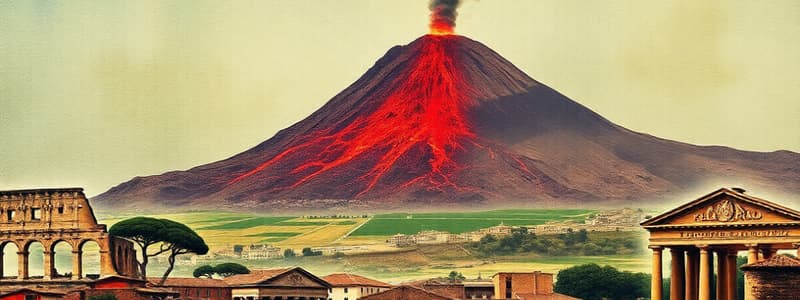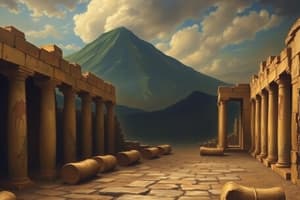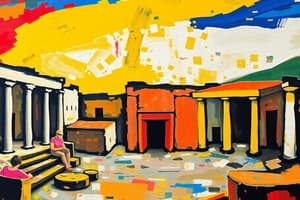Podcast
Questions and Answers
What significant event occurred in AD 79 that affected Herculaneum?
What significant event occurred in AD 79 that affected Herculaneum?
- The eruption of Mount Vesuvius (correct)
- The founding of the city
- The construction of new buildings
- A major earthquake
What was the primary reason for replacing the original beach sand at Herculaneum?
What was the primary reason for replacing the original beach sand at Herculaneum?
- To restore historical accuracy
- To ensure wheelchair accessibility (correct)
- To enhance the aesthetic value
- To prevent erosion
During which centuries did excavations in Herculaneum lead to the discovery of many artifacts?
During which centuries did excavations in Herculaneum lead to the discovery of many artifacts?
- 19th and 20th centuries
- 17th and 18th centuries
- 18th and 19th centuries (correct)
- 15th and 16th centuries
What led archeologists to initially believe that Herculaneum's residents escaped the eruption?
What led archeologists to initially believe that Herculaneum's residents escaped the eruption?
What notable find is associated with the skeleton known as the 'Ring Lady'?
What notable find is associated with the skeleton known as the 'Ring Lady'?
What remains were discovered in the boat houses of Herculaneum?
What remains were discovered in the boat houses of Herculaneum?
Where do visitors enter to see the restored beach at Herculaneum?
Where do visitors enter to see the restored beach at Herculaneum?
What does the discovery of skeletons in Herculaneum reveal about the event?
What does the discovery of skeletons in Herculaneum reveal about the event?
Flashcards
What is Herculaneum?
What is Herculaneum?
A small town near Pompeii, Italy, buried by the eruption of Mount Vesuvius in AD 79. The beach has been restored to its ancient state, allowing visitors to understand its history.
Why was Herculaneum a favorite spot for ancient Romans?
Why was Herculaneum a favorite spot for ancient Romans?
A popular tourist destination for wealthy Romans due to its mild climate.
How do the human remains in Herculaneum help us understand the past?
How do the human remains in Herculaneum help us understand the past?
The discovery of human remains in Herculaneum provide valuable insights into the lives and deaths of the residents during the AD 79 eruption.
Where were the majority of skeletons found in Herculaneum?
Where were the majority of skeletons found in Herculaneum?
Signup and view all the flashcards
What is a notable discovery at Herculaneum besides its beach?
What is a notable discovery at Herculaneum besides its beach?
Signup and view all the flashcards
How much ash buried Herculaneum?
How much ash buried Herculaneum?
Signup and view all the flashcards
Who is the "Ring Lady"?
Who is the "Ring Lady"?
Signup and view all the flashcards
What evidence suggests a Roman soldier was trying to rescue people during the eruption?
What evidence suggests a Roman soldier was trying to rescue people during the eruption?
Signup and view all the flashcards
Study Notes
Mount Vesuvius Eruption and Herculaneum
- Mount Vesuvius erupted in AD 79, burying Pompeii and Herculaneum under volcanic ash.
- Herculaneum, a Roman seaside resort, was covered by over 150 feet of ash.
- The Herculaneum beach has been restored and reopened in 2024.
- The restoration allows visitors to experience the beach as ancient Romans did.
- The original black sand beach has been replaced with a similar-toned material for accessibility.
- Herculaneum boasted well-preserved baths, an underground theater, and luxurious houses.
- It was a popular vacation spot due to its mild climate.
- Herculaneum was discovered in 1709.
- Excavations unearthed buildings, art, scrolls, and many other artifacts.
- Initial findings suggested residents escaped before the eruption.
- Later digs revealed over 300 skeletons, mainly near boats and on the beach.
- Researchers believe people sought refuge on boats awaiting rescue.
- The "Ring Lady" skeleton and that of a Roman soldier with weaponry were significant discoveries.
- Ongoing excavations at Pompeii, Herculaneum, and surrounding areas reveal further secrets.
- Recent findings include a shrine with blue walls and a banquet room with war paintings.
Studying That Suits You
Use AI to generate personalized quizzes and flashcards to suit your learning preferences.





